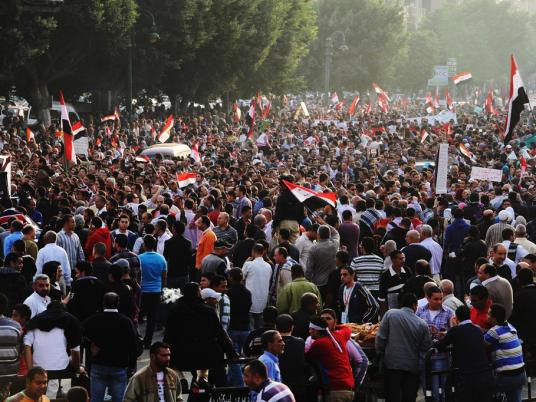
Islamists prepared to stage a rally in Alexandria on Friday that could fuel tensions on the eve of a divisive referendum that will shape the most populous Arab nation's political future.
The Muslim Brotherhood called for the mass gathering after a violent confrontation between Islamists and the liberal, secular opposition in Egypt's second city last week ended with a preacher besieged inside Al-Qaed Ibrahim Mosque for 14 hours. Rival factions were armed with clubs, knives and swords.
The run up to the vote on a new constitution has been marked by often violent protests that have cost at least 10 lives.
The Interior Ministry issued a statement on Friday morning asking that the rally remain peaceful.
"In light of calls by some political movements and opposition parties to gather for a demonstration on Friday in Alexandria … the Interior Ministry warns of the negative repercussions amid the current circumstances,” the statement read.
The ministry warned against a potential escalation of events, as happened last Friday.
"Facing these crowds constitutes a pressure on the police forces, which have to deal with these situations in the field and have to ensure the safety of citizens participating in these events. The Interior Ministry holds those who call for the protest responsible,” the statement continued.
"What the recent sit-ins and demonstrations have witnessed outside courts, places of worship and public facilities had a negative effect on the security of citizens and their property. Therefore, the Interior Ministry calls on political forces to keep the [demonstrations] peaceful, and stresses that the security forces will carry out their role and exert the utmost effort to keep citizens and property safe."
Islamists formed groups checking worshippers arriving for Friday prayers at Al-Qaed Ibrahim Mosque, scene of last week's violence. Central Security Forces were deployed nearby. The entrances of the al-Khaledeen Park overlooking the mosque were closed to prevent potential confrontations.
Protesters carried banners referring to last week's clashes read: "Our revolution will remain peaceful despite the thugs."
Demonstrators flocked to the mosque, while organizers set up a stage.
The Muslim Brotherhood, Salafi Dawah, Freedom and Justice Party, Nour Party and the Jama’a al-Islamiya have announced they would take part in the demonstration, alongside other Islamist forces.
President Mohamed Morsy and his Islamist allies back the draft constitution as a vital step in Egypt's transition to democracy almost two years after the fall of Hosni Mubarak.
The opposition, facing defeat in the referendum, has called for a "no" vote against a document it views as leaning too far towards Islamism.
The first day of voting on 15 December resulted in a 57 percent majority in favor of the constitution. The second stage on Saturday is expected to produce another "yes" vote as it covers regions seen as more conservative and likely to back Morsy.
The National Salvation Front, the main opposition coalition, said a "no" vote meant taking a stand against attempts by the Muslim Brotherhood, Morsy’s political base, to dominate Egypt.
"For the sake of the future, the masses of our people should strongly and firmly say 'no' to injustice and 'no' to the Brotherhood's dominance," the Front said in a statement.
The constitution must be in place before elections can be held. If it passes, the poll should be held within two months.
Morsy and his backers say the constitution is needed to seal a transition from decades of military-backed autocratic rule. Opponents say it ignores the rights of women and minorities, including the 10 percent of Egyptians who are Christian.
Demonstrations erupted when Morsy awarded himself sweeping powers on 22 November and then fast-tracked the constitution through a drafting assembly dominated by his Islamist allies and boycotted by many liberals.
The referendum is being held over two days because many of the judges needed to oversee polling stayed away in protest. In order to pass, the constitution must be approved by more than 50 percent of those voting.
Adding to the uncertainty as the final round of the referendum approaches, Egypt's chief prosecutor suddenly announced that he was retracting his decision to quit.
Prosecutor General Talaat Abdallah, appointed by Morsy when he assumed his new powers, said he had changed his mind because his resignation on Monday was under duress.
Abdallah had quit after more than 1,000 members of his staff gathered at his office to demand he step down because his appointment by the president, rather than by judicial authorities, threatened the independence of the judiciary.
After he announced he was staying, several prosecutors announced they were suspending work and would stage an open-ended protest outside Abdallah's office.




